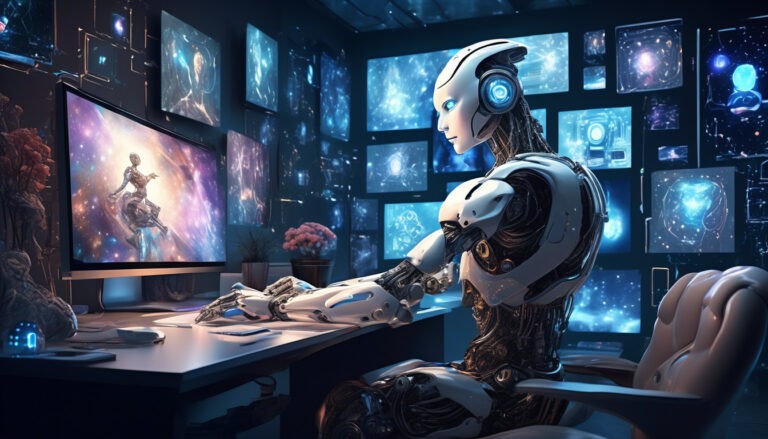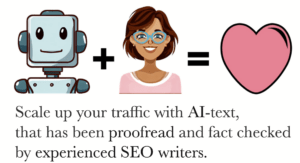In today’s digital landscape, AI-generated content is revolutionizing how we consume information, entertainment, and even advertising. As artificial intelligence continues to evolve, it’s not just transforming content creation but also reshaping consumer behaviors and expectations.
From personalized movie recommendations to automated news articles and virtual influencers, AI’s role in content production is making waves across various industries.
This shift isn’t just about the technology itself; it’s about how it changes the way we interact with media and the implications for businesses and creators striving to keep up with an ever-changing audience.
Let’s delve into how AI-generated content is impacting consumption, altering engagement patterns, and potentially redefining our cultural landscape.
Rise of AI in Content Creation
Artificial intelligence has revolutionized how you create and consume content. AI tools now enable you to generate articles, videos, and visuals at an unprecedented pace. This shift isn’t just about speed; it’s about accessibility. You no longer need extensive technical skills to produce professional-grade materials. With AI, you’re equipped to transform raw (ideas into polished products rapidly.
Moreover, AI’s role extends into research and data analysis, significantly reducing the time you spend on these tasks. It sifts through vast amounts of information to find relevant data, allowing you to focus on creativity and strategy. This not only streamlines your workflow but also enhances the quality of your output, ensuring you’re always ahead in the fast-evolving content landscape.
Enhanced Personalization for Consumers
AI-driven tools now tailor content to meet your specific interests and preferences, enhancing your engagement and satisfaction. Imagine logging onto your favorite streaming service or news site and finding everything organized just for you. These algorithms analyze your browsing habits and preferences to customize everything from the articles you read to the videos you watch.
This means you’re more likely to enjoy and engage with the content you’re presented with, as it resonates more deeply with your personal tastes and interests.
It’s almost as if the internet is morphing into your personal digital concierge, always ready to recommend the next article, show, or product that’ll catch your eye and keep you coming back for more.
Efficiency in Content Production
AI-driven tools significantly streamline the content creation process, allowing you to produce more with less effort. With these technologies, you’re equipped to generate articles, reports, and media at an unprecedented pace. They handle repetitive tasks, freeing you to focus on creative elements. This means you can rapidly adjust to market trends and audience preferences without sacrificing quality.
Moreover, these tools aren’t just fast; they’re also incredibly adaptive. You can tweak content styles and formats with minimal input, ensuring your outputs are not only prolific but also perfectly tailored. This adaptability extends your reach, letting you cater to diverse audiences simultaneously.
You’ll find that leveraging AI not only boosts your productivity but also enhances your capability to engage effectively.
Impact on Brand Messaging
AI-generated content significantly influences your brand’s voice and messaging consistency. It crafts messages quickly, ensuring you’re always in the conversation. However, it’s crucial you oversee these tools to maintain the unique tone that defines your brand.
When you integrate AI into your content strategy, it personalizes customer interactions by analyzing data and preferences. This not only enhances engagement but also strengthens your relationship with your audience. You’ll find your messages resonate more deeply because they’re tailored to meet specific needs and interests.
Remember, while AI helps in reaching out effectively, it’s your core. Values and vision should guide every piece of content. This synergy between human oversight and AI capabilities can elevate your brand to new heights.
Challenges for Human Writers
AI-generated content presents real challenges for human writers, as it reshapes the demand for traditional writing skills. You’re now competing with machines that churn out content rapidly, making it harder to secure gigs that once relied solely on human creativity. You’ve got to adapt quickly, enhancing your skills and finding new ways to stand out.
It’s not just about writing anymore; you need to offer something more personal, something AI can’t replicate.
Moreover, you’re facing a market where quantity often overshadows quality. Clients want fast and cheap results, and AI can provide that.
You must emphasize your unique insights and the human touch in your work, proving that depth and emotional connection still hold tremendous value in the digital age.
Ethical Considerations in AI Content
You must consider the ethical implications when deploying AI to generate content. It’s crucial to ensure transparency about the use of AI, particularly in how content is originated and altered. Misleading your audience about the human versus AI-generated origin can erode trust and damage reputations.
Furthermore, there’s a responsibility to avoid perpetuating biases. AI systems can inadvertently replicate existing prejudices found in their training data. You’re tasked with implementing rigorous checks to prevent such biases from influencing the content produced. This includes continuously updating and auditing datasets and algorithms to foster fairness and accuracy.
Lastly, respect for intellectual property& rights must be upheld. AI should not create content that potentially infringes on copyrighted materials without proper authorization. It’s about maintaining integrity in your content creation process.
Consumer Response and Engagement
Understanding how consumers respond and engage with AI-generated content is crucial for optimizing its impact and effectiveness. You’ll notice that different types of content, whether articles, videos, or interactive tools, influence your behavior and interaction differently.
Your feedback, through likes, shares, and comments, provides invaluable data that shapes future AI creations. It’s not just about how often you engage but the quality of your interactions that matters. When you find content relatable or personalized, you’re more likely to engage deeply.
Moreover, your acceptance or skepticism towards content authenticity affects your trust and long-term engagement. Each click, view, and interaction helps developers refine algorithms, ensuring content becomes more tailored and resonant with your preferences and expectations.
Future Trends in AI Content Creation
As AI continues to evolve, you’ll see more sophisticated and nuanced content being created that can anticipate and adapt to your preferences. Imagine AI that not only knows what you like but also understands the context of your needs, tailoring information and entertainment uniquely to you.
This shift means you’ll encounter AI tools designed to enhance creativity, pushing boundaries in arts and literature. Additionally, the integration of AI in content creation will likely drive new forms of storytelling, where interactive and immersive experiences become the norm.
You’ll witness a blending of human and machine creativity, fostering a new era where technology amplifies human expression rather than just mimicking it.
How does AI-generated content influence the authenticity of user-generated reviews and testimonials?
When AI generates content, it can blur lines between authentic user reviews and computer-generated ones.
Automated testimonials may lack genuine experiences, impacting trust.
Be cautious when relying solely on AI-driven content for decision making.
What legal considerations should businesses be aware of when using AI to generate promotional content?
When using AI for promotional content, be aware of legalities. Ensure compliance with copyright and data privacy laws.
- Disclose AI involvement transparently.
- Stay informed on regulations to avoid potential legal issues.
- Protect your business and reputation.
How can AI-generated content be integrated into traditional educational curriculums to enhance learning?
You can integrate AI-generated content into traditional educational curricums by incorporating interactive modules, personalized learning experiences, and real-time feedback.
This approach enhances student engagement, tailors instruction, and provides valuable insights for educators.
Conclusion
In conclusion, AI-generated content is revolutionizing consumption patterns. From personalized recommendations to automated content creation, AI is reshaping how individuals engage with information and products.
As technology continues to advance, the impact of AI on consumption will only grow stronger.
Embracing this shift can lead to more efficient and tailored experiences for consumers, ultimately transforming the way we interact with content in the digital age.





